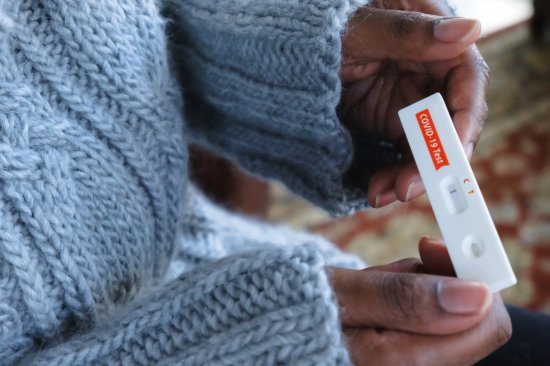
Are you more likely to get sick after having COVID-19?
Respiratory disease season is in full swing, with influenza, RSV, and COVID-19 case counts rising in various parts of the U.S. Hospitals in some states are also reporting upticks in pediatric pneumonia diagnoses, which experts say seems to be unrelated to the recent spike of pneumonias reported in China.
On the heels of last year’s severe flu and RSV reason, all this contagion has some people wondering if SARS-CoV-2, the virus that causes COVID-19, may be to blame. Some studies suggest the virus leaves its mark on the immune system even after an acute illness passes, raising an important question: does having COVID-19 increase your risk of getting sick from other viruses in the future?
[time-brightcove not-tgx=”true”]“Any time that we get an infection, it changes us,” says Dr. David Smith, chief of infectious diseases and global public health at UC San Diego Health. “It changes our B cells, which make antibodies, and it changes our T cells, which do cellular functions to clear out infections.”
Sometimes, these changes can be long-lasting. After a case of chickenpox, for example, the body typically builds lifelong immunity that prevents future bouts of the illness. But other viruses have more insidious effects. Measles essentially forces the body to re-learn how to fend off other infections, research shows, while HIV leaves people severely immunocompromised.
SARS-CoV-2 seems to fall somewhere between those two poles, though Smith emphasizes that research is ongoing. Reinfections are not only possible but common, ruling out the idea of widespread lifelong immunity—but there also isn’t currently evidence to suggest COVID-19 is causing population-wide immune deficiency, says Sheena Cruickshank, a professor of immunology at the University of Manchester in the U.K.
More From TIME
Some studies do, however, suggest that SARS-CoV-2 infections—particularly severe ones—can trigger changes to the immune system, including reductions in the number and performance of T cells; disruptions to B cells; deficiencies in dendritic cells, which regulate the immune response; and altered gene expression linked to increased inflammation. Some of these changes seem to last months after a serious case of COVID-19.
Scary as those findings sound, however, “you may see a gazillion changes, but you don’t know which of those changes may be relevant to future function,” says John Tsang, a professor of immunobiology at the Yale School of Medicine. In other words: changes to specific immune cells don’t necessarily mean that the whole system, or even part of it, will stop working.
It’s normal for immune markers to “ebb and flow” after an infection, Cruickshank adds, and even changes that sound bad won’t necessarily have long-lasting implications. “Studies that have looked more long-term have shown that, for most people, the immune response bounces back to normal and restores,” Cruickshank says. In one study co-authored by Tsang, men who recovered from mild COVID-19 actually mounted stronger immune responses to flu vaccines than men who had never had COVID-19, which could be beneficial. (Tsang and his co-authors didn’t observe the same trend in women.)
There are exceptions, though. People who have severe cases of COVID-19 may experience lasting health problems, either from the virus itself or from certain drugs used to treat serious COVID-19, such as steroids and immune-system modulators, Smith says. Many scientists also think that chronic Long COVID symptoms could be a sign of immune dysfunction, and recent research suggests people with Long COVID are more likely to get reinfected by SARS-CoV-2 than people who fully recover.
For people who had mild cases and no long-lasting symptoms, though, Tsang says the scientific literature does not support the idea of widespread immunosuppression after COVID-19. So why does it seem that people are getting sick more often now than before the pandemic?
There’s always the chance that COVID-19 is causing immune changes that haven’t shown up in the research yet, says Katelyn Jetelina, an epidemiologist who devoted a recent edition of her newsletter to COVID-19’s impact on the immune system. But she feels it’s likelier that people are simply more attuned to any respiratory symptoms they experience than they were a few years ago.
It’s also possible, Tsang adds, that the same revved-up immune response that COVID-19 survivors in his study mounted in response to the flu vaccine leads some people to experience more severe symptoms of common illnesses. “We may feel a bit sicker because of the inflammatory response,” Tsang says, “but it’s not because our system now no longer responds to an infection.”
Several years of decreased exposure to pathogens due to masking and social distancing may also have changed disease-transmission patterns, Cruickshank says. Children who were born during the pandemic may not have been exposed to germs they typically would have encountered as babies, leaving them to catch those bugs for the first time as toddlers or young kids. And even adults who’d had multiple prior brushes with common cold or flu viruses may now be faced with new strains of those viruses, to which their bodies are less familiar, Cruickshank says.
None of this is to say that COVID-19 is harmless. It is still a leading cause of death in the U.S.; Long COVID remains a serious risk; and there’s evidence that even seemingly mild infections can affect the heart, brain, and other organs. Avoiding the SARS-CoV-2 virus is still the safest move for your health—regardless of how it affects your risk of getting sick in the future.